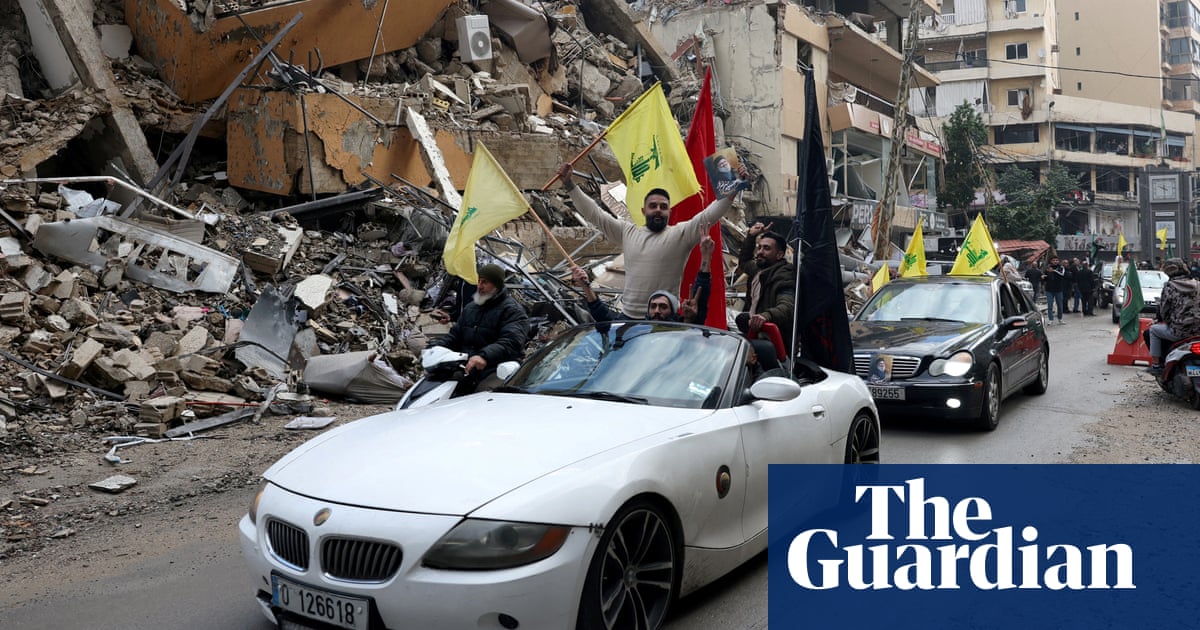Before the ceasefire had even come into effect, Zeinab and Dina were already driving south. The two sisters had been forced to flee to Tripoli, northern Lebanon, for 64 days – they had counted – and they could not bear another day without seeing home.
“We were laughing and crying at the same time when we heard the news of the ceasefire. We were packing our stuff and still we didn’t believe it was happening, it was like a dream,” said Zeinab, 28, a resident of the town of Zibqeen in south Lebanon.
She and Dina joined the tens of thousands of Lebanese who headed south on Wednesday morning after a ceasefire came into effect, ending more than 13 months of fighting between Israel and Hezbollah. Israel’s military warned residents not to return south, sending pre-recorded messages across Lebanon with a reminder that despite the ceasefire, south Lebanon was still a military zone.
Israeli warnings were cast aside and Lebanon’s coastal road was soon backed up, stuffed with mattress-laden cars, families sitting two to a seat. People lined the highway, waving flags and cheering on the cars returning south. “You’ve arrived safely, thank God,” Lebanese soldiers and paramedics said, greeting people as they entered Tyre’s city limits.
As the coastal highway ended and cars peeled off into the winding mountain roads of Lebanon’s south, the cheering grew quieter.
Rubble and downed power lines covered the streets. Almost every single home was damaged – some had their windows blown out, others had been completely flattened, their roofs split like firewood. Trees lay heavy with overripe fruits and rotting citrus lay on the ground; their owners had missed the harvest.
Zeinab and Dina arrived in Zibqeen to find their home in ruins. It had been destroyed while they were gone.
“We feel happy and sad at the same time. Thank God we are home, but at the same time, we are heartbroken over all those we lost,” Zeinab said, her two-year-old son on her shoulder as she spoke in front of the remains of her home town. The two sisters would not be able to stay the night; there was no habitable home in the village.
Other residents of Zibqeen had already set to work, sweeping away chunks of broken concrete and shattered glass with horsehair brooms and clearing a path for the cars passing through the town towards their own homes. “It will take a while but we will rebuild,” Zeinab said.
In Bint Jbeil, a village about a kilometre from the Israel-Lebanon border, the scene was similar. The city’s main hospital’s front entrance had been shattered and the adjacent mosque had fallen in on itself. Returning residents took selfies in front of the mosque’s emerald-green dome, somehow still largely intact despite the minaret having been blown up.
In a sports stadium in the city centre, the Hezbollah MP Hassan Fadlallah delivered a speech to a group of about a dozen reporters. He was declaring victory over Israel, proclaiming that “though it was painful” the group had prevented Israel from achieving any of its goals in south Lebanon.
Mohammed, who asked to be identified only by his first name, watched as residents of Bint Jbeil returned home. He had remained in the city throughout the prior two months, despite the advancing Israeli troops and the intense bombardment.
His phone lock screen bore a picture of his nephew, who had been killed fighting months earlier. “I am proud of his martyrdom. Blood is the price we need to pay for freedom,” he said, gesturing to the ruined city. He echoed the words of the Hezbollah MP and said that even with the scale of the destruction, the fact that Israel was not occupying south Lebanon was a victory.
In front of him were a group of women, crying and embracing as they saw their city for the first time in months. The mayor of the city, Afif Bazzi, declined a request for an interview, explaining that he was preoccupied with arranging the burial of the dead, their bodies finally able to be exhumed after weeks under the rubble.
In the distance, bursts of automatic gunfire rang out, prompting residents to begin to pack up and leave. “That’s Maroun al-Ras, it seems things are not settled there yet,” Mohammed said, referring to a village closer to the Israel-Lebanon border.
As the afternoon light began to fade, the southern villages emptied out once again. Just a few people sat and watched as cars passed, heading northwards. Dogs feasted on the corpse of a horse next to a stable, which seemed to have been abandoned some months prior. A Hezbollah Katyusha rocket launcher sitting in the back of a truck lay empty and unattended, its munitions spent and its tubes broken.
“We don’t know where we will sleep tonight – maybe Sour – but we will come back tomorrow,” Zeinab said.

